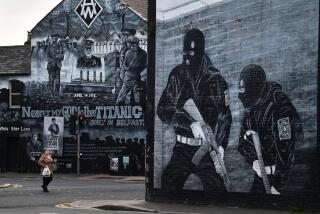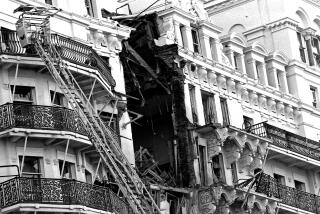Survivor of Enniskillen 1987 Blood Bath Relives Nightmare That Touched World
- Share via
DUBLIN, Ireland — Gordon Wilson touched hearts around the world with his grief-stricken words of forgiveness for the IRA bombers who killed his daughter in the war memorial massacre in Enniskillen, Northern Ireland.
“Dirty sort of talk is not going to bring her back,” he said in a moving interview that may have helped to stop another blood bath--Protestant extremist retaliation for one of the Irish Republican Army’s biggest bomb attacks.
Wilson received 10,000 letters of support after relating how he clutched the hand of his daughter, Marie, as she lay fatally injured under the ruins of Enniskillen’s community center. Her last words: “Daddy, I love you very much.”
Now, three years after the bombing that killed 11 people and injured 63 in the picturesque border town on Nov. 8, 1987, Wilson has tried to exorcise his grief with a poignantly told biography entitled “Marie.”
“It literally ripped a hole in the heart of the community but miraculously that heart beat continues and grows steadily stronger,” writes Wilson, who was showered with man-of-the-year and peace awards.
Queen Elizabeth II praised the depth of his forgiveness in her Christmas message.
“Spirit of Enniskillen” scholarships enabled children from across Northern Ireland’s sectarian divide to go abroad. The town opened its own integrated school.
About 300,000 people signed a book of condolence in the Dublin Lord Mayor’s residence.
Wilson won widespread praise for recently retelling the tragic story on Irish television and the biography has become a bestseller.
Still, the carnage continues. Sixty-five people have died so far this year in Northern Ireland’s political and sectarian conflict, topping the figure for all of 1989.
Enniskillen was not the catalyst, never the turning point that Wilson hoped it would be.
After the agony of the loss of his daughter, Wilson felt that the story of the 20-year-old nurse had to be told. He recalled it all just hours after the explosion in a hesitant voice that echoed round the world.
“The wall collapsed and we were thrown forward, rubble and stones all around us and under us. I remember thinking: ‘I’m not hurt but there is a pain in my shoulder.’ I shouted to Marie: ‘Are you all right?’
“She said ‘Yes.’ She found my hand and said “Is that your hand, Dad?’ I said: “ ‘Are you all right dear?’ But we were under six feet of rubble. Three or four times I asked her. Three or four times I asked her: ‘Are you all right Marie?’
“I asked her the fifth time. She said: ‘Daddy, I love you very much.’
“Those were the last words she spoke to me. I kept shouting ‘Marie, are you all right?’ There was no reply.
“I have lost my daughter but I bear no ill will, no grudge. Dirty sort of talk is not going to bring her back to life. I don’t have an answer. But I know there has to be a plan.
“If I didn’t think that, I would commit suicide. It’s part of a great plan and God is good. And we shall meet again.”
Doctors fought for five hours to save Marie’s life.
In the book her mother, Joan, recalls: “My darling Marie was dying. I kissed her and I shall always see her eyelids flickering to my dying day. Sister (a nurse) whispered very gently: ‘Mrs. Wilson, Marie’s heart has stopped beating.’ ”
Offering the best epitaph he can for his daughter, Gordon Wilson writes of the IRA bombers: “It cannot be easy to look at yourself in the mirror in such a situation.
“But I am not going to add to the hatreds by talking about bitterness or revenge. I’ll go on praying for all of them and leave the rest to God. That is the only way I can handle it and still live with myself.
“In life and after death there is only one ultimate standard by which we are judged. Marie showed that to us all as she lay under rubble at the cenotaph, holding my hand with her life slipping away. The bottom line is love. There is nothing more I can say.”
More to Read
Sign up for our Book Club newsletter
Get the latest news, events and more from the Los Angeles Times Book Club, and help us get L.A. reading and talking.
You may occasionally receive promotional content from the Los Angeles Times.










